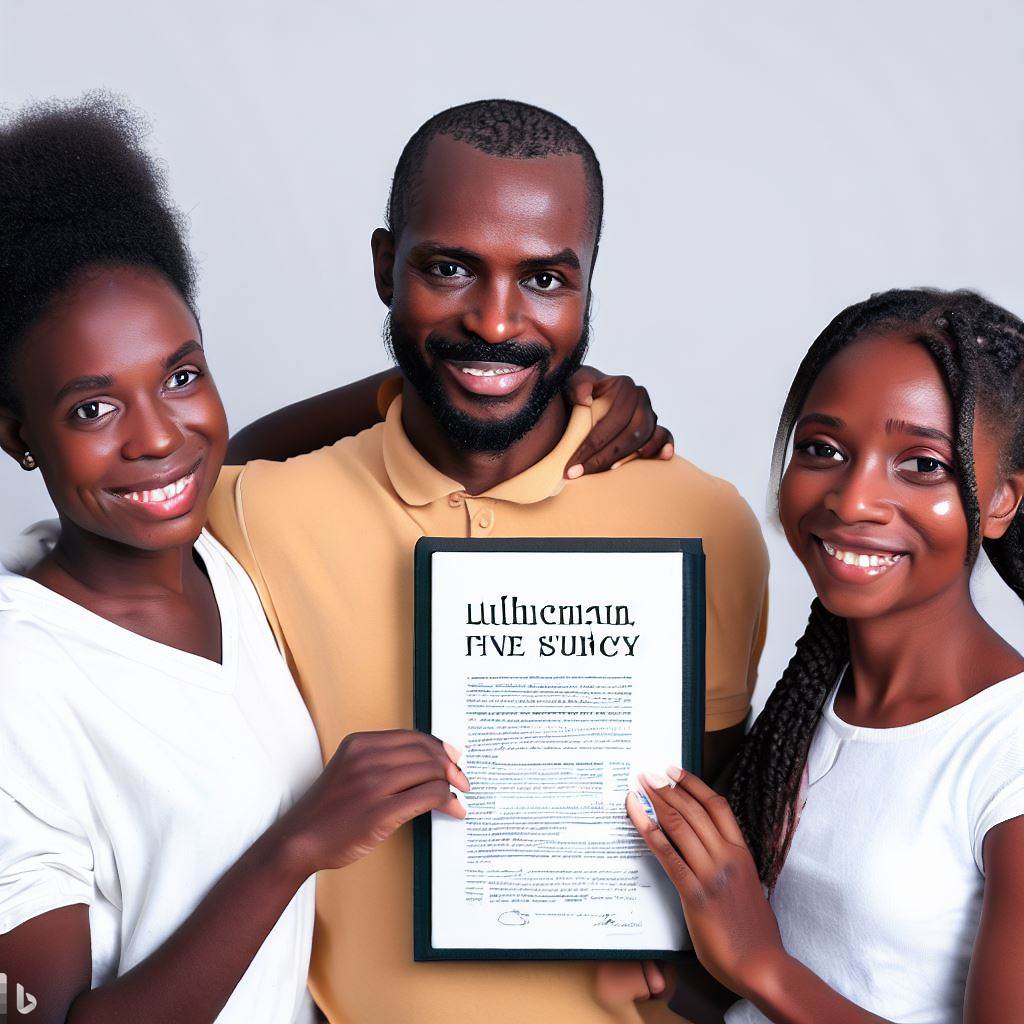Introduction
Car insurance is an essential aspect of owning and driving a car in Nigeria.
It provides financial protection in case of accidents, theft, or damage to your vehicle. Understanding the importance and intricacies of car insurance is crucial for all car owners.
Importance of Having Car Insurance
Car insurance serves as a safety net, offering financial coverage in case of unforeseen events.
It safeguards you against expensive repairs, medical expenses, and legal liabilities that may arise from accidents or theft.
Car insurance provides peace of mind and ensures that you are financially protected.
Goal of the Article
The goal of this article is to provide a comprehensive guide to car insurance in Nigeria, equipping readers with necessary knowledge and helping them make informed decisions.
It will outline the types of car insurance available, explain the factors affecting premiums, and offer tips for choosing the right insurance policy.
In essence, while owning a car in Nigeria gives you freedom and convenience, it also entails certain risks. Car insurance acts as a safety net, protecting you from potential financial burdens.
By understanding the basics of car insurance, you can make informed decisions and ensure your peace of mind on the roads of Nigeria.
Overview of Car Insurance
Car insurance is crucial for all car owners as it provides financial protection against unforeseen events. In Nigeria, choosing the right car insurance policy can be confusing, given the various options available.
To help you navigate through this process, we have compiled an overview of car insurance in Nigeria, explaining what it is, the different types available, and the basic components of a car insurance policy.
Car insurance is a contract between a car owner and an insurance company, wherein the car owner pays a premium in exchange for financial protection against any damage or loss to the car caused by accidents, theft, fire, or natural disasters.
This coverage also extends to any third-party liability arising from such incidents.
Types of Car Insurance in Nigeria
- Third-Party Car Insurance: This type of insurance provides coverage for damages or injuries caused to third parties involved in an accident. It is a mandatory requirement by law for all car owners in Nigeria. Third-party car insurance does not cover damages to your own car.
- Comprehensive Car Insurance: Comprehensive car insurance offers a wider range of coverage compared to third-party insurance. It covers damages to both your own car and third-party vehicles involved in an accident. This policy also provides protection against theft, fire, natural disasters, and other perils.
- Third-Party, Fire, and Theft Car Insurance: This type of insurance policy provides coverage for damages caused to third parties, as well as protection against fire and theft. It does not cover other damages like those caused by accidents or natural disasters.
Basic Components of a Car Insurance Policy
- Policyholder Information: The policy will include your personal details, including your name, address, contact information, and car details.
- Coverage Limits: The policy will specify the maximum amount the insurance company will pay in case of a claim, such as for repairs or medical expenses.
- Premium Amount: The premium is the amount you pay to the insurance company to maintain coverage. It is usually calculated based on factors like the car’s value, age, usage, and the driver’s history.
- Deductibles: A deductible is the amount you must pay out of pocket before the insurance coverage kicks in. It can help lower your premium but increases your initial expenses in case of a claim.
- Exclusions: This section outlines what the insurance policy does not cover, such as intentional damages, racing, or using the car for commercial purposes without proper coverage.
- Claim Process: The policy will provide information on how to initiate a claim, including the required documentation, reporting timeframes, and contact details of the insurance company.
In a nutshell, car insurance is an essential aspect of car ownership in Nigeria. Understanding the different types of car insurance available, such as third-party, comprehensive, and third-party fire and theft, can help you make an informed decision.
Additionally, familiarizing yourself with the components of a car insurance policy, including coverage limits, deductibles, and the claim process, ensures you are adequately protected in case of an unfortunate event.
Your Personalized Financial Plan
Get expert financial advice tailored exclusively to your goals. Receive a custom roadmap in just 1-3 business days.
Get StartedRemember, it is essential to compare policies from different insurance providers to find the one that best suits your needs. Stay protected and drive with peace of mind.
Read: The Evolution of Insurance Policies in Nigeria
Mandatory Car Insurance in Nigeria
Car insurance is a legal requirement in Nigeria, and it is important for every vehicle owner to be aware of the legal requirements to avoid facing severe consequences.
Let’s delve into the legal requirements for car insurance in Nigeria, discuss the consequences of driving without insurance, and provide information on the minimum coverage required by law.
Legal Requirements for Car Insurance in Nigeria
The Motor Vehicles (Third Party Insurance) Act, enacted in 1945, makes it compulsory for all vehicles to have insurance coverage.
According to this act, every vehicle owner must have at least a Third Party Motor Insurance cover. Third Party Motor Insurance covers liabilities for injuries or damages caused to others in a road accident.
The insurance policy must be obtained from an accredited insurance company in Nigeria.
Consequences of Driving Without Insurance:
Driving without insurance is an offense in Nigeria and can lead to significant consequences. Violators can face penalties ranging from fines to imprisonment, depending on the circumstances.
Uninsured drivers risk bearing the full cost of damages incurred in an accident, which can be financially debilitating.
In case of an accident, drivers without insurance may be held personally liable for medical expenses, property damage, and legal fees.
Minimum Coverage Required by Law
The minimum coverage required by law in Nigeria is Third Party Motor Insurance. This policy provides coverage for bodily injury or death to third parties and property damage.
The minimum limit for bodily injury or death per person is set at ₦1,000,000, while the limit per accident is ₦1,000,000 as well.
The minimum limit for property damage is set at ₦100,000. These limits are required by law, but it is advisable to consider higher coverage limits for better protection.
In general, car insurance is mandatory in Nigeria, and it is crucial to adhere to the legal requirements to avoid facing severe consequences.
Unlock a Debt-Free Future with Our Unique Strategies
Imagine a life unburdened by debt—a reality we help you visualize and achieve. We offer personalized strategies tailored to your unique situation, guiding you step-by-step toward financial freedom.
Start TodayThe Motor Vehicles (Third Party Insurance) Act makes it compulsory for vehicle owners to have at least a Third Party Motor Insurance cover from an accredited insurance company.
Driving without insurance can lead to penalties, financial liabilities, and legal troubles. The minimum coverage required by law includes bodily injury/death and property damage limits.
Remember, it is always recommended to consider higher coverage limits for better protection. Stay compliant and ensure that you always have car insurance when driving in Nigeria.
Read: Health Insurance in Nigeria: Why It’s Crucial
Factors Affecting Car Insurance Premiums
Factors influencing car insurance premiums in Nigeria
- Age: Younger drivers face higher rates due to inexperience and accident risks.
- Driving Experience: Seasoned drivers with clean records enjoy lower premiums.
- Car Type: Expensive and high-performance cars demand pricier coverage.
- Location: High-risk areas lead to increased insurance costs.
Tips to reduce premiums
- Obtain multiple quotes for comparison.
- Opt for a higher deductible to lower premiums.
- Grab available discounts (e.g., safe driving, anti-theft devices).
- Maintain a spotless driving record.
- Choose a vehicle with advanced safety features.
- Bundle car insurance with other policies for discounts.
- Pay premiums annually for potential savings.
- Regularly review and adjust your policy as needed. Drive safely for better rates.
Read: The Role of Insurance in Nigeria’s Financial Planning

Choosing the Right Car Insurance Policy
Importance of Comparing Insurance Policies
- Comparing insurance policies is crucial to ensure you get the best coverage at the most affordable price.
- By comparing, you can avoid overpaying for a policy that may not offer the coverage you need.
- It allows you to assess the benefits, exclusions, deductibles, and limits of different policies.
Factors to Consider when Selecting a Car Insurance Policy
- Coverage options: Determine the types of coverage you need, such as liability, collision, comprehensive, or uninsured motorist.
- Premium cost: Compare premiums from different insurers and consider your budget and financial capabilities.
- Policy limits: Assess the coverage limits offered by various policies to ensure they meet your needs.
- Deductibles: Consider the amount you will be responsible for paying before the insurance coverage starts.
- Exclusions: Understand what events or situations are not covered by the policy, such as certain acts of nature or intentional damage.
- Customer reviews and reputation: Research the insurer’s customer reviews and reputation for reliable service and quick claims processing.
Guidance on Assessing Insurance Companies and Their Offerings
- Financial stability: Check the insurer’s financial ratings from reputable rating agencies to determine their stability and ability to pay claims.
- Claims process: Review the claims process and turnaround time, ensuring it is convenient and quick.
- Customer service: Research the insurer’s customer service record and consider their responsiveness and reliability.
- Additional benefits: Explore any extra benefits offered by the insurance company, like roadside assistance or discounts for safe driving.
- Discounts and incentives: Inquire about any available discounts based on your driving record, car safety features, or multiple policies with the same insurer.
Now that you know the importance of comparing insurance policies, carefully assess the factors mentioned when selecting your car insurance.
Take the time to research insurance companies to make an informed decision. Remember, the right car insurance policy provides adequate coverage and peace of mind on the road.
Read: Financial Literacy: The Role of Insurance in Nigeria
Making a Car Insurance Claim
When it comes to making a car insurance claim in Nigeria, there are several important steps to follow.
By understanding and adhering to these steps, you can ensure a successful claim process. Here is a breakdown of the necessary actions and documents required:
When making a car insurance claim in Nigeria, follow these steps for success
- Report the incident immediately via phone or online portal.
- Provide accurate information, date, time, location, and involved parties.
- Gather evidence – photos, witness contacts, and the police report.
- Contact your insurer and fill out claim forms accurately.
- Submit supporting documents – police report, license, registration, and policy details.
- Attend the vehicle inspection as scheduled.
- Cooperate with investigations to validate the claim.
- Review the settlement offer carefully, seek advice if needed.
Tips to streamline the process
- Understand your policy and coverage.
- Keep documents organized – policy details, receipts, and correspondence.
- Act promptly to report and follow up on the claim’s progress.
- Seek professional advice if facing complexities during the process.
Essentially, making a car insurance claim in Nigeria requires prompt reporting, gathering of evidence, providing accurate information and documentation, and cooperating with your insurance company.
By following these steps and streamlining the process, you can ensure a smoother and more successful claims experience.
Uncover the Details: The Role of Insurance in Nigeria’s Financial Planning
Additional Car Insurance Considerations
When it comes to car insurance in Nigeria, there are several additional coverage options available.
Unlock Untapped Nigerian Wealth with Our Expert Advice
Imagine accessing investment opportunities others overlook—stocks, bonds, real estate, small businesses tailored to you. We offer personalized advice you won't find elsewhere, guiding you to financial success.
Unlock WealthWhile the basic third-party insurance is mandatory, it is important to consider other coverage options based on your individual needs and budget.
Comprehensive Insurance
One of the most popular additional coverage options in Nigeria is comprehensive insurance. This type of coverage provides protection for your car against a wide range of risks, including theft, fire, vandalism, and natural disasters.
Although comprehensive insurance may come at a higher cost, it offers peace of mind and financial security. It is particularly recommended for new and high-value cars.
Personal Accident Cover
In Nigeria, personal accident cover is another important consideration. This coverage provides compensation in case of accidental injury or death as a result of a car accident.
Medical expenses, hospitalization costs, and even funeral expenses can be covered by personal accident cover. It is a valuable investment, especially if you frequently travel with family members or dependents.
Third-Party Property Damage
While third-party insurance is mandatory, it is also worth considering additional coverage for third-party property damage. This coverage protects you financially if your car causes damage to someone else’s property.
Repair costs or compensation for damaged property can be quite expensive. Having third-party property damage coverage ensures that you are protected from such financial liabilities.
Excess Protection
Excess protection is an optional coverage that can be added to your car insurance policy in Nigeria. It provides coverage for the excess amount you would need to pay in case of a claim.
This coverage is particularly beneficial if you have a high excess amount, as it can save you from having to pay a significant sum out of pocket in the event of an accident or damage to your car.
Legal Liability to Passengers
If you often have passengers in your car, considering legal liability cover for them is recommended. This coverage provides compensation to your passengers in case of accidental injury or death.
It covers medical expenses, hospitalization costs, or funeral expenses of the passengers.
This additional coverage ensures that you are financially protected in case of any unfortunate incidents involving passengers.
Determining the Need for Additional Coverage
Deciding whether to opt for additional coverage should be based on your individual circumstances and preferences.
Consider factors such as the value of your car, your driving habits, and the level of financial risk you are comfortable with.
Evaluate the benefits and costs of additional coverage options and assess whether the added protection is worth the expense.
It is advisable to consult with an insurance professional who can guide you in making an informed decision.
In summary, there are several additional car insurance coverage options available in Nigeria.
It is important to understand the benefits and costs associated with each option and assess whether they are necessary for your specific needs.
Considering additional coverage can provide you with greater peace of mind and financial protection for both you and your car.
Conclusion
This article highlighted the key points about car insurance in Nigeria. It emphasized the importance of having car insurance to protect oneself financially in case of any unforeseen accidents or damages.
It is crucial for every car owner in Nigeria to ensure they are adequately insured.
By having car insurance, individuals can have peace of mind knowing that they are protected against potential financial burdens.
It covers expenses related to repairs, medical bills, and damages caused to others. Car insurance also complies with legal requirements, as it is mandatory in Nigeria.
To avoid financial setbacks and legal consequences, readers are encouraged to take action and get car insurance.
They should understand the various coverage options available and choose one that suits their needs and budget. It is also recommended to compare quotes from different insurance providers to get the best deal.
Having car insurance is not only a legal obligation but also a wise investment. It provides financial protection and ensures that car owners are prepared for any untoward incidents on the road.
So, take a proactive step and ensure you are adequately insured to drive safely and confidently in Nigeria.




